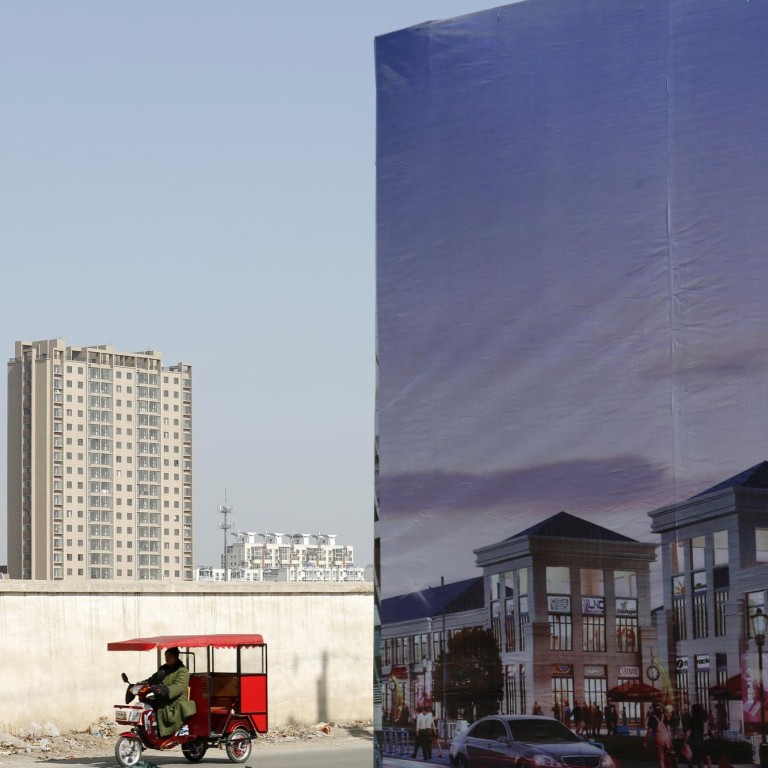
Hooked on land sales
Local governments' addiction to revenue raised by selling land to developers is hindering attempts to contain the mainland housing boom
Mainland cities, addicted to the money they raise by selling land to developers, are undermining the central government's campaign to contain housing costs.

Local officials rely on revenue from the sales to repay debt, especially as economic growth slows. Developers bid up prices because demand from homebuyers remains strong. The cycle is driving property costs higher, complicating Premier Li Keqiang's task of preventing social unrest over the lack of affordable housing amid a massive urbanisation programme.
"If the momentum in the land market can't be cooled down rather quickly, it's actually a fairly dangerous signal," said Bei Fu, Standard & Poor's Hong Kong-based property credit analyst. "Should it keep heating up, we're worried there might be further policy tightening, and there could be consequences for the entire market that are unpredictable at this point."
The central government has been trying to cool the housing market since April 2010, following a 14 per cent jump in new home prices the previous year. The most recent curbs, introduced in March by Li's predecessor, Wen Jiabao, included higher down-payment requirements and interest rates for second-home mortgages in cities with "excessively fast" price gains. Thirty-five cities set price-control targets, mostly capping increases at the growth rate of local incomes.
Li has not taken additional steps as he seeks to rein in prices without hurting economic growth, which has slowed to less than 8 per cent for five consecutive quarters. At the same time he has championed urbanisation as a "huge engine" of the mainland's future economy, a campaign that requires affordable housing for the millions of people moving from rural areas to cities.
We’re worried there might be further policy tightening [in the land market]
His job is made harder as mainlanders, disillusioned by financial markets, keep buying property.
The benchmark Shanghai Composite Index is down 58 per cent since the end of 2007. New home prices in the mainland's four major cities posted their biggest year-on-year rises since January 2011 last month, led by a 19 per cent jump in Guangzhou, the National Bureau of Statistics said. They jumped 15 per cent in Beijing and Shanghai.

Builders have been buying more land to keep up with demand. China Vanke, the largest developer by sales, bought 3.4 million square metres of land in the first half of this year, almost five times its purchases in the first half of last year, according to company filings. The average cost of land for new projects jumped 23 per cent.
Vanke said it had a "prudent" land purchase strategy and would not assume large home-price gains in estimating profitability of projects, adding that projects under planning as of June 30 remained at a "reasonable" level.
Moody's Investors Service expects the 19 developers it tracks to "remain active in acquisitions in the coming three to six months, as they replenish their land banks to support their long-term growth plans", Hong Kong-based senior analyst Kaven Tsang wrote last month.
That is soothing news for city officials. An audit by the National Audit Office of 36 local governments, including Shanghai and Guangzhou, found that some regions faced "growing pressures to repay debt".
Four provinces and 17 provincial capitals had borrowed 774.7 billion yuan as of the end of last year, pledging repayment with land-sale proceeds, up 18 per cent from 2010, according to an audit office report in June.
Local government financing vehicles' reliance on land sales and rising land prices to repay debt creates "many problems", People's Bank of China governor Zhou Xiaochuan wrote in a commentary published on the central bank's website this month.
The central government is considering expanding trials of property taxes as part of efforts to diversify sources of local revenues, though such reforms take time and cannot quench cities' near-term funding thirst, Fu said.
